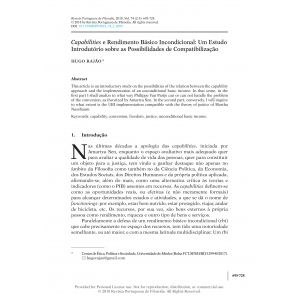Anderson, Elisabeth. “What Is the Point of Equality?”. Ethics 109, no. 2 (1999), https://doi.org/10.1086/233897.
Anderson, Elisabeth. “Justifying the capabilities approach to justice”. In Measuring Justice: Primary Goods and Capabilities, edited by Harry Brighouse & Ingrid Robeyns, 81-100. Cambridge: Cambridge University Press, 2010.
Barclay, Linda. “What kind of liberal is Martha Nussbaum?”. SATS: Northern European Journal of Philosophy 4, no. 2 (2003).
Barclay, Linda. “The Importance of Equal Respect: What the Capabilities Approach Can and Should Learn from Human Rights Law”. Political Studies 64, no. 2 (2016), https:// doi.org/10.1111/1467-9248.12175.
Claassen, Rutger. “The Capability to Hold Property”. Journal of Human Development and Capabilities 16, no. 2 (2015), https://doi.org/10.1080/19452829.2014.939061.
Dworkin, Ronald. “What is Equality? Part 2: Equality of Resources”. Philosophy and Public Affair 10, no. 4 (1981), http://www.jstor.org/stable/2265047.
Marneffe, Peter. “Liberalism, Liberty and Neutrality”. Philosophy and Public Affairs 19, no. 3 (1990), http://www.jstor.org/stable/2265396.
Nelson, Eric. “From Primary Goods to Capabilities: Distributive Justice and the Problem of Neutrality”. Political Theory 36, no.1 (2008), https://doi.org/10.1177/0090591707310088.
Nussbaum, Martha. Women and Human Development: The Capabilities Approach. Cambridge: Cambridge University Press, 2000.
Nussbaum, Martha. Frontiers of Justice: Disability, Nationality, Species Membership. Cambridge MA: The Belknap Press, 2006.
Nussbaum, Martha. Creating Capabilities: The Human Development Approach. Cambridge MA: The Belknap Press, 2011.
Pogge, Thomas. “Can the Capability Approach Be Justified?”. Philosophical Topics 30, no. 2 (2002), https://doi.org/10.5840/philtopics200230216.
Rawls, John. “Social unity and primary goods”. In Utilitarianism and beyond, edited by Amartya Sen & Bernard Williams, 159-185. New York: Cambridge University Press, 1996.
Rawls, Rawls. A Theory of Justice: Revised Edition. Cambridge MA: The Belknap Press, 1999.
Richardson, Henry. “The Social Background of Capabilities for Freedoms”. Journal of Human Development 8, no. 3 (2007), https://doi.org/10.1080/14649880701462213.
Robeyns, Ingrid. “Selecting Capabilities for Quality of Life Measurement”. Social Indicators Research 74 (2005), https://doi.org/10.1007/s11205-005-6524-1.
Robeyns, Ingrid. “Justice as Fairness and the Capability Approach”. In Arguments for a Better World: Essays in Honor of Amartya Sen: Volume II, edited by Kaushik Basu & Ravi Kanbur, 497-413.New Delhi: Oxford Univerity Press, 2008.
Robeyns, Ingrid. Wellbeing, Freedom and Social Justice: The Capability Approach Re-examined. Cambridge: Open Book Publishers, 2017.
Sen, Amartya. “Equality of What?”. In The Tanner Lectures on Human Values, edited by Sterling McMurrin, 1997-220. Salt Lake City: University of Utah Press, 1980.
Sen, Amartya. “Poor, Relatively Speaking”. Oxford Economic Papers New Series 35, no.2 (1983), http://www.jstor.org/stable/2662642.
Sen, Amartya. “Justice: Means versus Freedoms”. Philosophy and Public Affairs 19, no. 2 (1990), http://www.jstor.org/stable/2265406.
Sen, Amartya. Inequality Reexamined. Oxford: Clarendon Press, 1992.
Sen, Amartya. Development as Freedom. New York: Alfred A. Knopf, 1999.
Sen, Amartya. The Idea os Justice. Cambridge MA: The Belknap Press, 2009.
Silvers, Anita. “Reconciling Equality to Difference: Caring (F)or Justice For People With Disabilities”. Hypatia 10 (1995), https://doi.org/10.1111/j.1527-2001.1995.tb01352.x.
Terzi, Lorella. “What metric for disabled people? Capability and disability”. In Measuring Justice: Primary Goods and Capabilities, edited by Harry Brighouse & Ingrid Robeyns, 150-173. Cambridge: Cambridge University Press, 2010.
Van Parijs, Philippe. “Why Surfers Should be Fed: The Liberal Case for an Unconditional Basic Income”. Philosophy and Public Affairs 20, no. 2 (1991), http://www.jstor.org/stable/2265291.
Van Parijs, Philippe. Real Freedom for All: What (if anything) can justify capitalism? Oxford: Oxford University Press, 1995.
Van Parijs, Philippe & Vanderborght, Yannick. Basic Income: A Radical proposal for a Free Society and a Sane Economy. Cambridge MA: Harvard University Press, 2017.
Wolff, Jonathan & De-Shalit, Avner. Disadvantage . Oxford: Oxford University Press, 2007.









